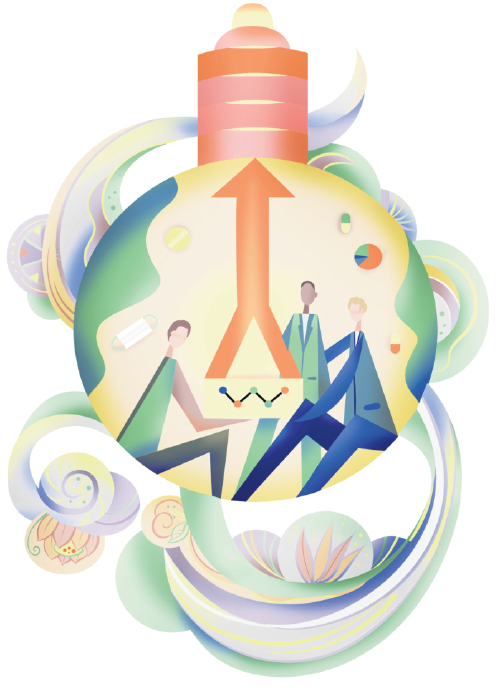Inspiring cooperation
By Ma Jiantang ( China Daily Global ) 2020-10-09

Ma Xuejing/China Daily
Think tanks can help promote cross-border cooperation for the joint building of Belt and Road Initiative in the post-pandemic era
The world economy has plunged into recession due to the novel coronavirus outbreak and anti-globalization headwinds.
But the development of the Belt and Road Initiative has not halted amid the pandemic. Instead, from January to August, China's trade volume with countries involved in the initiative grew by 0.5 percent year-on-year to $860 billion, accounting for 29.2 percent of the country's total foreign trade, an increase of 0.3 percent. In the Belt and Road countries, Chinese enterprises' outbound direct investment in non-financial sectors increased by 31.5 percent to $11.8 billion, accounting for 17.2 percent of its total foreign direct investment, up 4.8 percent year-on-year.
In August, 1,247 China-Europe freight trains carried 113,000 TEUs (twenty-foot equivalent units) of goods, up 62 percent and 66 percent respectively year-on-year. At the same time, progress has been made on major projects such as the China-Laos railway, Jakarta-Bandung High-speed railway, Belgrade-Budapest railway and Nairobi-Malaba standard gauge railway.
Promoting the joint building of the Belt and Road will be an urgent task in the post-pandemic era, as doing so will give a great boost to the global economic recovery and sustainable growth, advance economic globalization, and improve the global economic governance system.
Meticulous planning is needed to promote the joint building of the Belt and Road.
At the macro level, interconnection of infrastructure should be further promoted, the development policies of participating countries should be aligned, universally-accepted rules and standards on the Belt and Road Initiative should be formulated, and global cooperation mechanisms should be enhanced.
At the micro level, exemplary projects which are financially sustainable, cost effective, environmentally friendly, inclusive and transparent with controllable risks and multi-stakeholders should be established in order to maximize the contributions the Belt and Road Initiative makes to the UN 2030 Agenda for Sustainable Development and the sustained growth of developing countries.
Think tanks can play their roles in supporting the policy coordination in the process by carrying out joint research, exchanges and consultations on major challenges confronted in promoting the Belt and Road Initiative and related responses, thus reaching consensuses on the issues.
For example, the Silk Road Think Tank Network (SiLKS), of which I am the co-chair, was established in 2015 by the Development Research Center of the State Council. It was designed to inspire think tanks to promote cross-border cooperation. SiLKS now has 59 members and partners, among which 41 are think tanks from 33 countries, 11 international organizations including the UN Development Program and UN Industrial Development Organization, and seven are transnational companies.
Since its inauguration five years ago, SiLKS has carried out joint studies on key issues such as the alignment of development policies, infrastructure interconnection, and the formulation of international rules and standards for countries and regions involved in the Belt and Road Initiative, as well as on the initiative's alignment with the mid-and long-term goals of the UN 2030 Agenda for Sustainable Development, improvement of the global economic governance system and building of a community with a shared future for humankind.
The think tank network has rolled out a batch of influential research findings and practical policy suggestions. For instance, the Silk Road Think Tank Network Declaration on Joint Action that was released in 2017 and the Three-Year (2019-21) Work Plan on Promoting the Development of the Silk Road Think Tank Network were included in the list of deliverables of the two sessions of the Belt and Road Forum for International Cooperation, which provided high-level intellectual support for building the Belt and Road Initiative.
More members and partners are joining SiLKS. This year, the UN Conference on Trade and Development, UN Economic Commission for Africa, African Capacity Building Foundation, the African Economic Research Consortium (AERC) of Kenya, and Ethiopia Policies Research Center have become new members of SiLKS.
Nevertheless, SiLKS still needs to improve its governance mechanism and cooperation efficiency. Therefore, we have revised the guiding principles of SiLKS, to further clarify the rights and obligations of members and partners of SiLKS, and the rules for the approval of new members and the exit of old ones. We established a more representative Steering Committee with stronger leadership to play its role in reviewing and consulting on major issues. The execution mechanism of the secretariat has been enhanced to enable it to focus on priorities.
Since the outbreak of the pandemic, the secretariat of SiLKS has donated anti-pandemic materials to members and partners whose countries or regions have been hard hit. In the recently held annual meeting, SiLKS published a joint initiative to cement global partnership and multilateralism mechanism, and promote the high-quality building of the Belt and Road Initiative in the post-pandemic era.
In the post-pandemic era, countries will face daunting challenges in containing the disease, and ensuring economic development and people's livelihoods. SiLKS has a big role to play in promoting cooperation in finance and trade, innovation and technology, as well as cultural exchanges. We will promote people-to-people exchanges, increase communication, enhance the sharing of knowledge and expertise, and deepen cooperation on issues such as debt and financing, green development, inclusive development, third-party market cooperation, and technological innovations, thus building more consensuses.
To build the Belt and Road Initiative into an initiative featuring cooperation, health, recovery, growth and greenness is of great significance for the world to prevail over the pandemic, to fuel the global economic recovery and to promote sustainable development, as well as to improve the global economic governance system.
The author is the co-chair of the Silk Road Think Tank Network (SiLKS) and the secretary of the Leading Party Members' Group of the Development Research Center of the State Council. The author contributed this article to China Watch, a think tank powered by China Daily. The views do not necessarily reflect those of China Daily.














